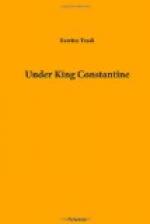With wide eyes searching his lone cell for cause
He waited: as the ray became more clear
And more effulgent than the mid-day sun,
He trembled with that chill of mortal flesh
Beholding spiritual things. At last—
Now vaguely as though veiled by light, and then
With shining clearness, perfectly—he saw
The sight unspeakable, transcending words.
Forth from his barren cell came Kathanal,
Strong and inspired, born anew for deeds.
Straightway he grew to be the bravest knight
Under King Constantine, since Sir Sanpeur;
The boldest in the battles for the right;
The kindest in his judgment of the wrong.
His eyes that held the vision of the Grail
Were ever clear to see and know the truth;
His lips that had been touched by holy chrism
Were strong to utter holy living words;
He sang of life in life, and life in death,
And taught the lesson that his heart had learned—
All love should be a glory, not a doom;
Love for love’s sake, albeit bliss-denied.
To his old home beside the sapphire sea
Floated his songs and his far-reaching fame;
For in the land no name was loved so well
As Kathanal the peerless Minstrel Knight.
Lone in her chamber sat Leorre, and heard
The songs of Kathanal by courtiers sung—
Arousing words, like a clear clarion call
To truth and virtue, purity and faith.
She clasped her hands and bent her head, and wept
In silent passion pent-up tears, for joy;
For now she knew—far off, beyond her sight—
Her love had seen the sacred Holy Grail.
And, as she listened, inspiration came,
Irradiating all her spirit, lifting it
Beyond her sorrow and her daily want
Of Kathanal. Soft through her soul there crept
The echo of a benedicite,
Enwrapping her in calm, triumphant peace.
Then she arose, put on her whitest robe,
And went out radiant, strong, and full of joy.
Note to text beginning “A marvellous ray of light, mysterious,...” [Transcriber’s Note: “Note to Page 88” in the original text]
“In the midst of the blast entred a sunne beame more clear by seaven times then ever they saw day, and all they were alighted of the grace of the holy Ghost”
* * * * *
“Then there entred into the hall the holy grale covered with white samite, but there was none that might see it, nor who beare it, and there was all the hall fulfilled with good odours.”
* * * * *
“Then he listned, and heard a voice which sung so sweetly, that it seemed none earthly thing, and him thought that the voice said, ’Joy and honour be to the Father of heaven.’”
Sir Thomas Malory, “La Mort d’Arthure”




